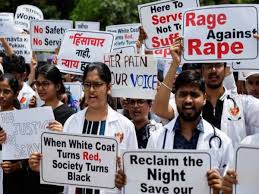NEW DELHI: The doctors’ strike in the national capital over the rape and murder of a medic at a state-run hospital in Kolkata entered its seventh day on Sunday, as non-emergency services, including OPD, remained paralysed.
Protests began here on Monday evening. Initially restricted to medical college campuses, doctors started taking to the streets from Friday over the incident at the R G Kar Medical College and Hospital in Kolkata earlier this month.
According to an action plan, members of resident doctors’ associations (RDA) in Delhi took out a candle light march from outside Gate 1 of the Rajiv Chowk Metro Station at Connaught Place.
Dr Parth Mishra, vice president of UCMS and GTB Hospital RDA, told reporters that as discussed, resident doctors from medical institutions participated in the march.
The demonstrators, who are demanding a central law to check violence against on-duty health personnel and justice for their peer, formed a human chain in the Connaught Place Inner Circle.
Efforts were also made to interact with the public to raise awareness about the incident.
Those part of the march, which ended around 9 pm, raised slogans in support of their demands. They displayed placards demanding justice for the victim and one of them read “when the white coat turns red, society turns black”. A few children holding the Tricolour were also spotted in the march.
Late on Sunday, resident doctors announced that their strike will continue. In an action plan for Monday, a meeting is scheduled for 9 am on in front of the GTB Hospital’s gate.
Following the meeting, the doctors will proceed to Nirman Bhawan at 11 am, according to a joint statement by RDAs.
Dr Dhruv Chauhan, health activist and national council member of the Indian Medical Association’s junior doctors network, alleged, “Some hospital administrations are threatening doctors to return to duty while they are peacefully protesting for their rights.”
“Does this mean we don’t even have the freedom to exercise our right to speech and protest as permitted by the Constitution?” he asked.
If the authorities had issued as many circulars to protect doctors’ rights and security, such an incident might never have happened, Chauhan added.
The strike has affected academic activities, outpatient departments (OPDs), ward services, and elective surgeries at public as well as private health facilities.
Essential emergency services, including Intensive Care Units (ICUs), emergency procedures, and emergency surgeries, continue to operate.


